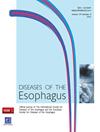804. NUTRITIONAL OUTCOMES AND IMPACT OF MALNUTRITION IN A RANDOMIZED COMPARISON BETWEEN STANDARD AND PROLONGED TIME TO SURGERY AFTER NEOADJUVANT CHEMORADIOTHERAPY FOR ESOPHAGEAL CANCER
IF 2.3
3区 医学
Q3 GASTROENTEROLOGY & HEPATOLOGY
引用次数: 0
Abstract
Background Prolonged time to surgery (TTS) after neoadjuvant chemoradiotherapy (nCRT) may enable malnourished oesophageal cancer patients´ nutritional status to recover better, possibly improving outcomes after esophagectomy. Methods This is a substudy within a randomised multicenter controlled trial comparing outcomes in esophageal cancer patients after standard TTS of 4-6 weeks to prolonged TTS of 10-12 weeks after nCRT. Patients were categorized as malnourished or non-malnourished at baseline and compared regarding nutritional endpoints. Results The mean weight decreased significantly from baseline to the standard TTS (p<0.001) while at the prolonged TTS it had recovered to baseline level (p=0.131), Figure 1. There was no significant difference in postoperative complications between patients malnourished at baseline when allocated to standard compared to delayed surgery (OR: 0.90, 95% confidence interval, CI: 0.29-2.77 and OR 1.13, 95% CI: 0.32-4.00, respectively). Patients malnourished at baseline had a strong trend to worse survival after delayed compared to standard TTS, Hazard ratio (HR) 1.72 (95%, CI: 0.82-3.59, p=0.147). which was less pronounced for non-malnourished patients, HR 1.26 (95% CI:0.82-1.94, p=0.291). Conclusions Prolonged TTS led to better weight recovery at time of surgery. Patients malnourished at baseline did not benefit in terms of less postoperative morbidity after delayed surgery and had a stronger trend to detriment in survival from delayed surgery than non-malnourished patients.804.食管癌新辅助化放疗后标准手术时间和延长手术时间的随机比较中营养结果和营养不良的影响
背景 新辅助化放疗(nCRT)后延长手术时间(TTS)可使营养不良的食管癌患者的营养状况得到更好的恢复,从而改善食管切除术后的预后。方法 这是一项随机多中心对照试验的子研究,该试验比较了食管癌患者接受 4-6 周标准 TTS 后与接受 nCRT 后 10-12 周延长 TTS 后的疗效。患者在基线时被分为营养不良和非营养不良,并就营养终点进行比较。结果 从基线到标准 TTS,平均体重明显下降(p<0.001),而在延长 TTS 时,体重已恢复到基线水平(p=0.131),图 1。与延迟手术相比,基线营养不良患者的术后并发症没有明显差异(OR:0.90,95% 置信区间:0.29-2.77;OR:1.13,95% 置信区间:0.32-4.00)。与标准 TTS 相比,基线时营养不良的患者在延迟 TTS 后的存活率呈显著下降趋势,危险比 (HR) 为 1.72 (95%, CI: 0.82-3.59, p=0.147),而非营养不良患者的这一趋势并不明显,危险比为 1.26 (95% CI:0.82-1.94, p=0.291)。结论 延长TTS可使手术时体重恢复得更好。与非营养不良患者相比,基线时营养不良的患者在延迟手术后并不能从较低的术后发病率中获益,而且在延迟手术后的存活率方面有更强的不利趋势。
本文章由计算机程序翻译,如有差异,请以英文原文为准。
求助全文
约1分钟内获得全文
求助全文
来源期刊

Diseases of the Esophagus
医学-胃肠肝病学
CiteScore
5.30
自引率
7.70%
发文量
568
审稿时长
6 months
期刊介绍:
Diseases of the Esophagus covers all aspects of the esophagus - etiology, investigation and diagnosis, and both medical and surgical treatment.
 求助内容:
求助内容: 应助结果提醒方式:
应助结果提醒方式:


